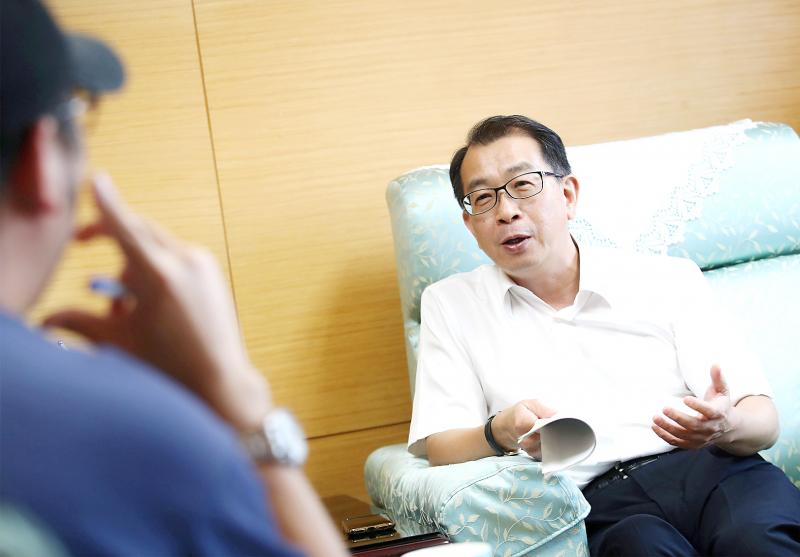The National Sports Training Center would refrain from using US pork as an ingredient in meals served to athletes, as ractopamine is listed by the World Anti-Doping Agency as a banned substance, Sports Administration Director-General Chang Shao-hsi (張少熙) has said.
The center serves as the training base for the nation’s top athletes scheduled to compete in the Tokyo Olympic Games next year.
Chang said in an interview with the Central News Agency that allowing the importation of US pork containing ractopamine is a national policy, but athletes are a special group of people.

Photo: CNA
“We would make sure that the athletes need not have to worry about whether what they eat in the center could get them in trouble. My job is to make sure that all the cattle in the bullpen are well taken care of,” Chang said during the interview.
The center would also conduct daily, weekly and monthly inspections of the food served at the center, so that the athletes can be assured of the safety of the food they consume, Chang said.
The center would also reinforce athletes’ education on how they should eat when they are not in the center, he added.
“The center would protect them from consuming pork containing ractopamine residue, but it would not be able to protect them when they are outside, where they could consume meatballs and steamed buns with pork from questionable sources,” he said.
The center can only ask the athletes to be responsible for what they eat and that they should ascertain the source of the food before they consume it, Chang added.
During a visit to the center last week, he instructed the center to recruit experts to identify meat products containing ractopamine residue and determine how long the residue can remain in the human body, Chang said.

A preclearance service to facilitate entry for people traveling to select airports in Japan would be available from Thursday next week to Feb. 25 at Taiwan Taoyuan International Airport, Taoyuan International Airport Corp (TIAC) said on Tuesday. The service was first made available to Taiwanese travelers throughout the winter vacation of 2024 and during the Lunar New Year holiday. In addition to flights to the Japanese cities of Hakodate, Asahikawa, Akita, Sendai, Niigata, Okayama, Takamatsu, Kumamoto and Kagoshima, the service would be available to travelers to Kobe and Oita. The service can be accessed by passengers of 15 flight routes operated by

Chinese spouse and influencer Guan Guan’s (關關) residency permit has been revoked for repeatedly posting pro-China videos that threaten national security, the National Immigration Agency confirmed today. Guan Guan has said many controversial statements in her videos posted to Douyin (抖音), including “the red flag will soon be painted all over Taiwan” and “Taiwan is an inseparable part of China,” and expressing hope for expedited reunification. The agency last year received multiple reports alleging that Guan Guan had advocated for armed reunification. After verifying the reports, the agency last month issued a notice requiring her to appear and explain her actions. Guan

GIVE AND TAKE: Blood demand continues to rise each year, while fewer young donors are available due to the nation’s falling birthrate, a doctor said Blood donors can redeem points earned from donations to obtain limited edition Formosan black bear travel mugs, the Kaohsiung Blood Center said yesterday, as it announced a goal of stocking 20,000 units of blood prior to the Lunar New Year. The last month of the lunar year is National Blood Donation Month, when local centers seek to stockpile blood for use during the Lunar New Year holiday. The blood demand in southern Taiwan — including Tainan and Kaohsiung, as well as Chiayi, Pingtung, Penghu and Taitung counties — is about 2,000 units per day, the center said. The donation campaign aims to boost

The Central Weather Administration (CWA) said a magnitude 4.9 earthquake that struck off the coast of eastern Taiwan yesterday was an independent event and part of a stress-adjustment process. The earthquake occurred at 4:47pm, with its epicenter at sea about 45.4km south of Yilan County Hall at a depth of 5.9km, the CWA said. The quake's intensity, which gauges the actual effects of a temblor, was highest in several townships in Yilan and neighboring Hualien County, where it measured 4 on Taiwan's seven-tier intensity scale, the CWA said. Lin Po-yu (林柏佑), a division chief at the CWA's Seismological Center, told a news conference